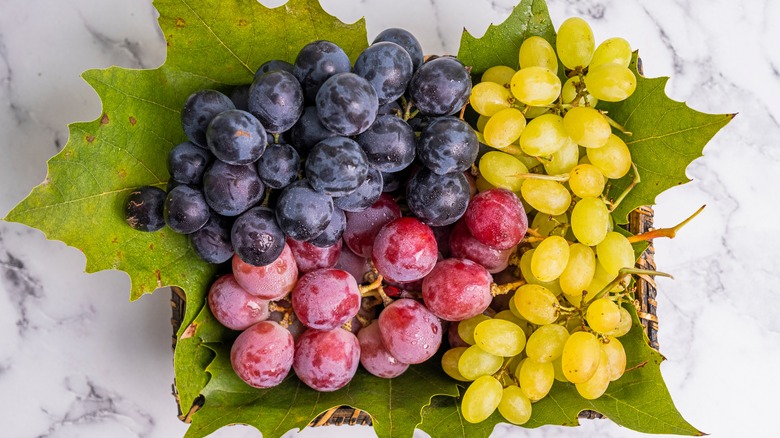How Much Sugar Is In A Serving Of Grapes?
With their naturally sweet flavor, grapes can be a healthy substitute for cookies, cakes, or candies. What makes them stand out is their high nutritional value. These tiny fruits boast over 1,600 compounds with therapeutic activity, including resveratrol, melatonin, and quercetin, according to 2015 research published in the Annals of the New York Academy of Sciences. Resveratrol — one of the most abundant antioxidants in grapes and red wine — may protect against cancer, heart disease, inflammation, and cardiometabolic conditions. Other compounds, such as quercetin, may reduce high blood pressure and cholesterol levels, notes the Icahn School of Medicine at Mount Sinai.
These fruits are also rich in vitamin C, offering about 4% of the recommended daily allowance per cup, per MyFoodData. You'll also get a hefty dose of vitamin K, plus moderate amounts of thiamin, niacin, and vitamin B6. What's more, a cup of grapes provides nearly one-third of the recommended daily intake of manganese, an essential mineral that regulates energy metabolism, immune function, and bone development (via National Institutes of Health).
Grapes are relatively low in calories, but they pack a lot of sugar. One cup boasts 62 calories and 16 grams of carbs, including 1 gram of dietary fiber. Fructose, a naturally occurring sugar in grapes, can affect your health when consumed in excess. After ingestion, this nutrient is metabolized by the liver and then used for energy. Over time, high fructose intake may contribute to diabetes and liver disease, warns the National Academy of Sports Medicine (NASM).
Why you can enjoy grapes without the guilt
One cup of green or red grapes has 23.4 grams of sugar, per FoodData Central. In comparison, a Snickers bar has 20 grams of sugar, reports Spoon University. Some grape varieties, such as Cotton Candy Grapes, boast nearly 30 grams of sugar per cup (per FatSecret)!
These fruits, however, also contain resveratrol and other key nutrients that you won't find in milk chocolate. Plus, they're a good source of fiber, which slows sugar absorption into the bloodstream, explains the Mayo Clinic. What's more, grapes have a moderate glycemic index (GI), so they won't spike your blood sugar levels when consumed in moderation. A 2009 review published in the Journal of Nutrition suggests that grapes may actually benefit people with diabetes due to their high antioxidant content.
While it's true that sugar is sugar — no matter where it comes from, fruits pack more nutrition than candy and other treats. As the NASM notes, eating up to 80 grams of fructose per day is likely safe for most people. However, there are cases where it makes sense to cut back on fructose and avoid fruits like mango, grapes, or apples. For example, some individuals have difficulty digesting this sugar and may experience bloating and gas after eating high-fructose foods, says the University of Virginia.


